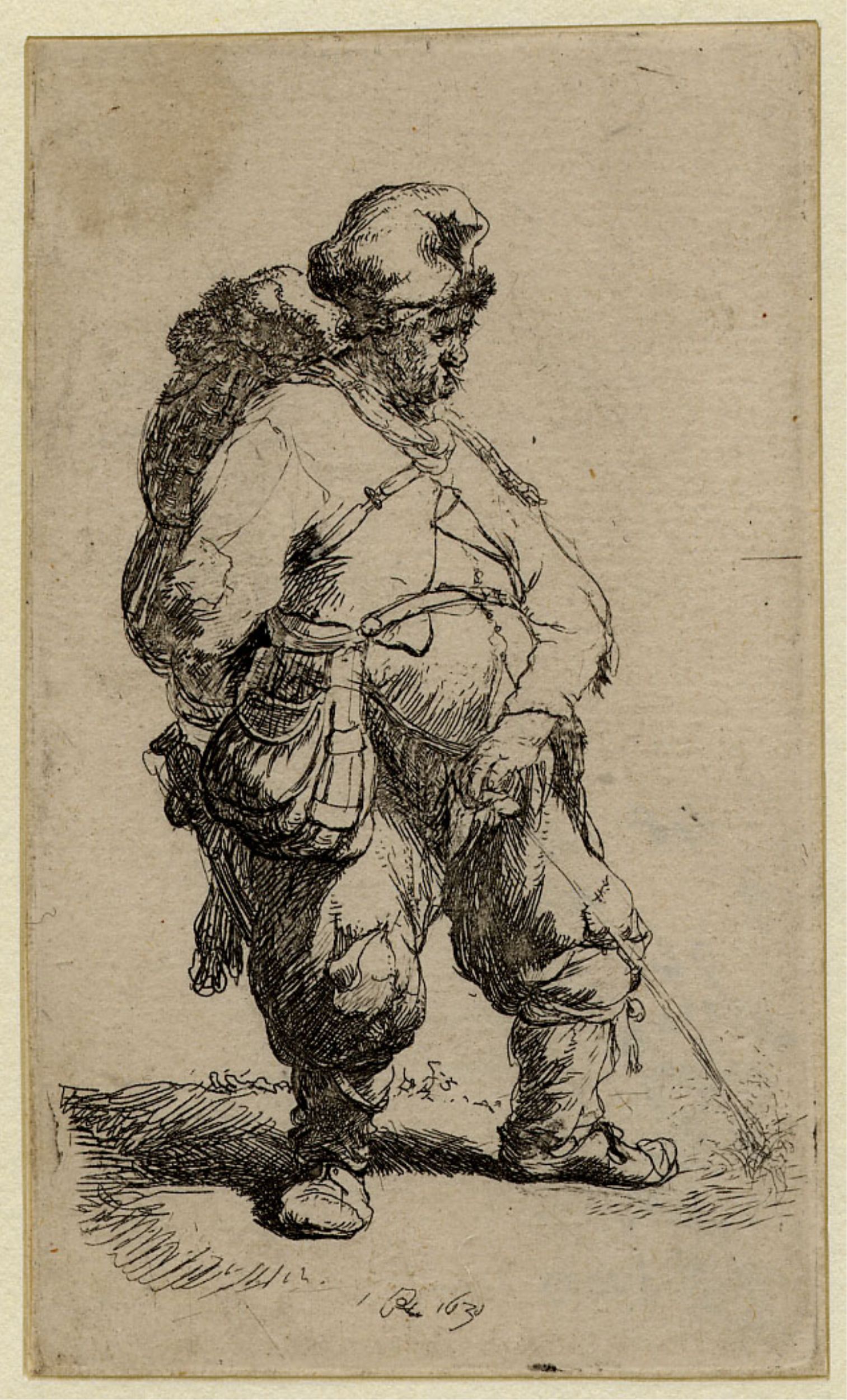
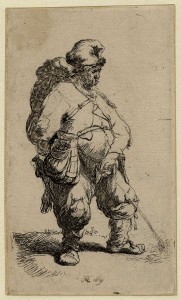
In numerous medical texts from the early modern period writers described the many different disorders that affected the ability to urinate, including painful urination, dripping urine and a complete inability to urinate. These problems were not just inconvenient they could be deadly: Philip Woodman cautioned in 1722 that a ‘total Suppression of Urine [that] last above Nine days `tis Mortal.’1
A suppression of the urine or retention of the urine, as The English uparalell’d Physitian explained, had many causes including ‘gravell, that stoppeth the conduits’, ‘want or weaknesse of the virtue expulsive’, carnosity and corrupt humours which restrained the urine.2 Lazarus Riverius’s medical text added that it could be caused by a loss of sense in the bladder, a palsy or by cold which dulls the sense of the bladder and weakens its expulsion.3
The particular focus of these texts on a lack of expulsive actions may have affected more than just health. Patricia Simmons has argued that urination was a key part of masculinity, which was long characterised by casting forth bodily fluids from the penis.4 In particular the ability to urinate standing up was a defining feature distinguishing the genders.5 Indeed although numerous medical texts included cases of women suffering from urinary obstructions and suppressions, it was generally considered to be a masculine disorder – men’s narrower urinary passages were thought to be more prone to blockages and obstructions.
Simmons has also argued that surgeon’s like Paré in extreme cases provided ‘prosthetic’ penises to restore the ability to urinate forcefully and in the standing position to men whose penises had been damaged. These, she suggests, were also used by cross-dressing women in order to maintain their disguise – they allowed women to urinate standing and so present an outward appearance of masculinity.6
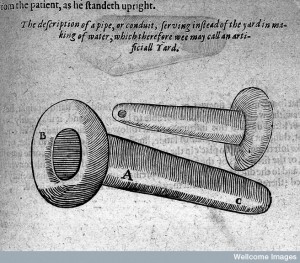
Credit: Wellcome Library, London.
Men suffering from an inability to urinate did not necessarily have to sit down, like women, in order to urinate. Yet male readers of such texts, and those suffering from such distempers, may have recognised the degrading nature of disrupted urination. However, in many texts the concern about these problems is primarily pain, discomfort and potential danger to the body and life.
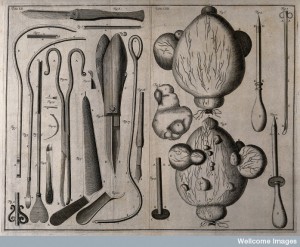
Credit: Wellcome Library, London.
As this problem had many causes the curative response took many forms. The use of catheters to allow the urine to flow out of the bladder and relieve the internal pressure was one option. Many texts also advocated one or two, what we might term, generic treatments designed to encourage the flow of urine out of the body. Some of these remedies appear rather innocuous, like those listed in Culpeper’s Last Legacy:
To provoke Urine
Vervain boiled in water, provokes Urine exceedingly; but you must drink the decoction; it is not the boiling of it will do the deed.
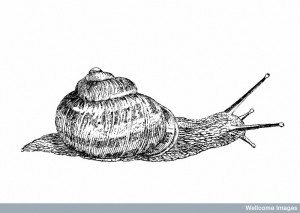
Credit: Wellcome Library, London
Take Snails, shells and all, and burn them in a crucible, till the ashes be white; half a dram of this taken in white-Wine is a great provoker of Urine.
Take good Saffron powder, and mix it with as much black Soap, and spread it on the fleshy-side of a piece of Leather, and lay it to the Navil of one that cannot make water, and in one hour you shall see the effects of it.7
Others sound rather less pleasant, like those found in the posthumous edition of Felix Platter’s Golden Practice of Physick. This treatise claimed that ‘Divers things are applied outwardly to the Share neer the Bladder, that dilate it and provoke Pissing’ including ‘Hot Cow-dung also with Cummin-seed and Oyl of Scorpions’.8
John Johnston’s The Idea of Practical Physick offered the similarly appealing ‘Goats piss dranke warme, its caule and guts applied to the belly’ or ‘earth worms in number five, drunk with sweet wine’ as a remedy for Ischury (a failure of the expulsive faculty).9
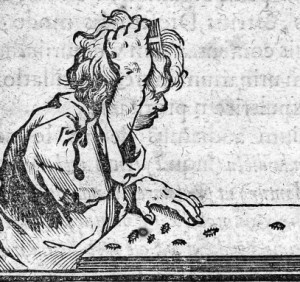
Credit: Wellcome Library, London.
One cure sounds particularly unappealing to a modern reader and perhaps offered the prospect of ever more discomfort: Platter’s text suggested that ‘Chimches, Fleas, and Lice may be put into the Yard [penis], or small Hairs, to provoke Urin.’10
For some men these problems were persistent over many years and difficult to cure. This was the case for one man described in the medical treatise of Isbrand van Diemerbroeck:
a Merchant about fifty Years of Age was troubled with a difficulty of Urine; so that his Urine did not only drizzle from him with great difficulty and Pain, but also very often came not forth at all. The cause was a certain viscous and tenacious Slime, which at times falling down, in great quantity to the Bladder, did so besiege the Sphincter, that it stopped both it’s own and the passage of the Urine. This Slime descending through the passage of the Yard, and coming forth, was tough, and many times might be drawn out in ropes with the Fingers, many times it stick so obstinately to the passage, that there was a necessity of it loosening it and drawing it forth with a long Silver-Headed-Bodkin; this Malady had been familiar to him for many Years, and sometime seized him three, four and five time a Year, and between the Intervals, he voided a great quantity of slimy Flegm, many noted Physitians had used several Remedies for the cure of this Malady; but all in vain which Physitians vary’d in their opinions concerning the cause and generation of that same tough and slimy Flegm; as also about the place from whence it descended so Periodically; In the mean while the Patient could neither be cured by others, nor by my self.11
The patient’s only relief was drinking a potion which mitigated his pains and provoked the urine by making the urinary passages slippery allowing the thick and viscous phlegm to be voided easily.12 In this case the patient was able to experience some relief from the inconvenient, uncomfortable and uneasy pain of urinary retention. He was in that sense one of the lucky ones, although it was relief acquired through the rather unappealing process of having a bodkin, a thick blunt needle with a large eye (which were also used to scrape away ear wax), inserted into the penis to loosen his troublesome secretions.
__________
1. Philip Woodman, Medicus Novissimus; Or, The Modern Physician: Shewing the Principal Signs, Causes, and most Material Prognosticks … (London, 1722), 133; Riverius argued that above seven days was a hazard to life, Lazarus Riverius, Nicholas Culpeper, Abdiah Cole, The Practice of Physick, In Two Volums, Very Much Enlarged, (London, 1658), 395.
2. Daniel Border, Polypharmakos kai chymistes: Or, The English uparalell’d Physitian and Chyrurgian, (London, 1651), 73.
3. Lazarus Riverius, Nicholas Culpeper, Abdiah Cole, The Practice of Physick, In Two Volums, Very Much Enlarged, (London, 1658), 394.
4. Patician Simmons, ‘Manliness and the Visual Semiotics of Body Fluids in Early Modern Culture’, Journal of Medieval and Early Modern Studies, 39/2 (2009), 331-373, 332.
5. Ibid, 333-334.
6. Ibid, 337.
7. Nicholas Culpeper, Culpeper’s Last Legacy … (London, 1671), 83, 108.
8. Felix Platter, A Golden Practice of Physick … (London, 1662) , 144.
9. John Johnston, The Idea of Practical Physick (London, 1657), 59.
10. Felix Platter, A Golden Practice of Physick, 144.
11. Isbrand van Diemerbroeck, The Anatomy of Human Bodies, Comprehending the Most Modern Discoveries and Curiosities in that Art (London, 1689), 88.
12. Ibid.
© Copyright Jennifer Evans, all rights reserved.
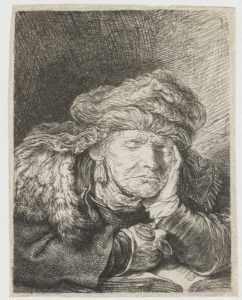
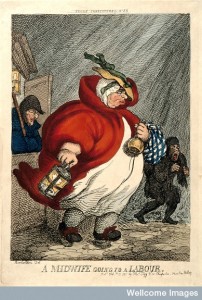

and let’s not forget the gentleman of Sienna, reported by Burton in the Anatomy of Melancholy:
The pleasantest dotage that ever I read, saith Laurentius, was of a gentleman at Senes in Italy, who was afraid to piss, lest all the town should be drowned; the physicians caused the bells to be rung backward, and told him the town was on fire, whereupon he made water, and was immediately cured.
What a fantastic example, thank you. I also like Felix Platter’s suggestion that it frequently at banquets and to those who simply forget to urinate due to old age
‘This is incident to them that sit long at banquets and are ashamed to rise and make water; or otherwise for want of a convenient place, stay so long that they cannot Piss. Doting people that are very contemplative forget Pissing and other Functions which depend upon the will in part.’